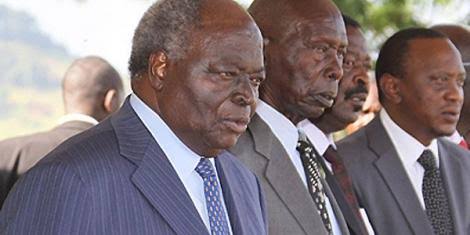Investigations
Report: For 20 Years Kenyan Politicians And Cronies Stashed Sh300B Of Aid Money In Foreign Accounts

The country is the fourth-largest economy by GDP in sub-Saharan Africa (SSA) after Nigeria, South Africa, and Angola.
With a GDP of $109bn, Kenya is the largest economy in eastern Africa, having overtaken Ethiopia in 2017.
The economy is larger than the combined economies of Tanzania and Uganda, its two East African Community (EAC) partners.
And Kenya is the only country in eastern Africa to have significantly reduced poverty, having graduated from low-income to middle-income level.
Yet Kenya faces an internal challenge thatpersistently undermines its development potential — the country’s ruling elites and their appetite for corruption.
A World Bank study on foreign aid shows it ends up in the pockets of ruling elites in recipient countries rather than going to those that it is meant to help
The World Bank’s study, Elite Capture of Foreign Aid: Evidence from Offshore Bank Accounts, published on February 18, came as a shock. The term “élites” is defined as ruling politicians, bureaucrats and their cronies in the private sector involved in aid-funded projects.
The main finding of the study is that aid disbursements “coincide with significant increases in deposits held in offshore financial centres known for bank secrecy.”
Put another way, ruling politicians, bureaucrats and their friends stash billions of dollars in secret offshore banks whenever foreign aid lands in their country. The research used quarterly information on aid disbursements from the World Bank in combination with Bank for International Settlements (BIS) banking statistics.
The BIS data provided the flows between aid recipients and final havens such as Switzerland and Luxembourg, where secrecy is paramount.
In the East Africa Community, the larger the economy, the more aid money the ruling elites captured and stashed into offshore foreign bank accounts.
Between 1990 and 2010, Kenyan politicians and their cronies transferred US$3bn. In Tanzania, the EAC’s second-largest economy, the elites siphoned off US$586m. Uganda came next with US$270m, followed by Rwanda on US$190m, and lastly, Burundi with US$122m.
The amount of foreign aid diverted by Kenyan ruling elites is appalling.
The US$3b stashed in offshore accounts for 20 years works out at US$150mn a year. That kind of money can build, for example, a power plant that generates electricity for an entire rural district.
Trailblazers, leaders and titans
Complete the form for your free download of The Africa Report’s 2019 list of the 100 most influential Africans. Get your free PDF by completing the following form.
Asset Recovery
The good news is that the ruling elites are finding it harder to stash cash in the West, including havens such as Switzerland.
- The Stolen Asset Recovery Initiative (StAR) led by the World Bank is spearheading the global fight against corruption and recovery of corrupt assets, with good results. This effort complements institutional mechanisms launched by the EU and the US which are making it harder for ruling elites to stash cash in the West.
- The EU’s anti-money laundering directive prompted by the Panama Papers requires disclosure of asset owners and beneficiaries in a publicly available register.
- The Kleptocracy Asset Recovery Initiative at the US Department of Justice seizes stolen assets.
- The UK’s Unexplained Wealth Orders allow courts to order “politically exposed persons” to explain why their assets are so much larger than their salaries back home.
Perhaps most surprising is the robustness of asset-recovery by the leading haven, Switzerland, which has returned millions of dollars stolen by corrupt African politicians. StAR indicates that to date, Swiss authorities have returned to Nigeria US$700m stolen by the military ruler Sani Abacha.
The Swiss and Kenyan governments are engaged in a similar exercise. In 2018, Kenya’s President Uhuru Kenyatta and his Swiss counterpart Alain Berset signed an agreement to recover assets stashed in Swiss banks.
In 2015, 12 years after the Anglo Leasing scandal which reportedly transferred US$700mn to foreign banks, was exposed, Kenya brought charges against 13 prominent Kenyans and foreign accomplices. This was the first time that powerful people in Kenya had been charged in a major financial scandal. The legal breakthrough was achieved after the unprecedented co-operation between Swiss authorities and Kenya’s Ethics and Anti-Corruption Commission.
The Kenyan case proves that fighting high-level corruption and recovering stolen assets stashed in offshore banks can only succeed if three parties are involved: aid donors, haven countries, and the states from which the thieving elites hail.
David Himbara.
Kenya Insights allows guest blogging, if you want to be published on Kenya’s most authoritative and accurate blog, have an expose, news TIPS, story angles, human interest stories, drop us an email on [email protected] or via Telegram
-

 Grapevine2 weeks ago
Grapevine2 weeks agoRussian Man’s Secret Sex Recordings Ignite Fury as Questions Mount Over Consent and Easy Pick-Ups in Nairobi
-

 News1 week ago
News1 week agoTHE FIRM IN THE DOCK: How Kaplan and Stratton Became the Most Scrutinised Law Firm in Kenya
-

 Investigations1 week ago
Investigations1 week agoMulti-Million Dollar Fraud: Three Kenyans Face US Extradition in Massive Cybercrime Conspiracy
-

 Economy1 week ago
Economy1 week agoIran Demands Arrest, Prosecution Of Kenya’s Cup of Joe Director Director Over Sh2.6 Billion Tea Fraud
-

 Business1 week ago
Business1 week agoA Farm in Kenya’s Rift Valley Ignites a National Reckoning With Israeli Investment
-

 Africa2 weeks ago
Africa2 weeks agoFBI Investigates Congresswoman Ilhan Omar’s Husband’s Sh3.8 Billion Businesses in Kenya, Somalia and Dubai
-

 Grapevine4 days ago
Grapevine4 days agoA UN Director Based in Nairobi Was Deep in an Intimate Friendship With Epstein — He Even Sent Her a Sex Toy
-

 Politics2 weeks ago
Politics2 weeks agoSifuna, Babu Owino Are Uhuru’s Project, Orengo Is Opportunist, Inconsequential in Kenyan Politics, Miguna Says
















